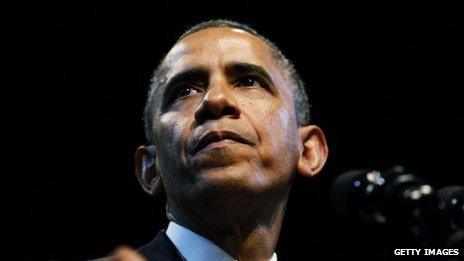What to do about income inequality (if anything)
- Published
- comments

President Obama has tried to put the spotlight on income inequality since a high profile speech in December
President Barack Obama will give his State of the Union address on Tuesday, and advance word is that income inequality will be a key theme, external. Among the policy objectives he may discuss are an increase in the minimum wage, extending long-term unemployment benefits and making college more affordable.
It won't be the first time the president has discussed the growing gap between the rich and the poor in the US. In a speech on 4 December, external, he called it "the defining challenge of our time".
But should inequality really be a concern? According to new poll by the Pew Research Center and USA Today, 65% of Americans believe inequality has grown in the past decade, but partisan divides are clear. Ninety percent of Democrats think the government should take steps to reduce the income gap, compared to only 45% of Republicans.
"US president Obama faces a constituency united over the problem, but divided on solutions," says BBC's David Botti in this week's Face Facts.
The US has one of the highest income gaps in the developed world
The split was made starkly clear in a column by the New York Times's David Brooks last week - and the sharp response it provoked.
Brooks wrote, external that the "debate is confusing matters more than clarifying them".
He contends that Mr Obama and his supporters group together two unrelated issues: the increasing concentration of wealth in the top 5 percent and the plight of the chronically poor. One has little to do with the other, he writes.
Policymakers who are attempting to address income equality, he continues, are focusing on the wrong solutions - such as the minimum wage - instead of addressing single motherhood, low social mobility and "the fraying of social fabric".
"If we're going to mobilize a policy revolution, we should focus on the real concrete issues: bad schools, no jobs for young men, broken families, neighborhoods without mediating institutions," he concludes.
Former US Secretary of Labour Robert Reich calls Brooks' theory, external "baloney". The social ills Brooks discusses are a direct result of the lack of "buoyant growth" in the middle class, which then adversely affects the poor:
America's shrinking middle class also hobbles upward mobility. Not only is there less money for good schools, job training, and social services, but the poor face a more difficult challenge moving upward because the income ladder is far longer than it used to be, and its middle rungs have disappeared.
As wealth becomes more concentrated in the hands of the few, he writes, their political power grows, "drowning out the voices of average Americans, filling the campaign chests of candidates who will do their bidding, financing attacks on organized labor, and bankrolling a vast empire of right-wing think-tanks and publicists that fill the airwaves with half-truths and distortions."
The political power of the wealthy, writes, external the Nation's Eric Alterman, causes the "extreme version of 'inequality' experienced by the United States compared to other advanced industrial nations".
"Brooks, like other conservative commentators, seeks to evade the fundamental facts of economic inequality by shifting the ground to cultural, social and 'behavioral' terrain," he contends.
That the debate is now being conducted over how to best address income inequality is an indication that President Obama is successfully defining its terms. Whether that can be converted into political gains and actual policy implementation, however, remains to be seen.
Any significant proposals he makes during the State of the Union address, of course, will have to be approved by a Congress where many Republicans are more closely aligned with the views of syndicated columnist Walter Williams, who argues that income is the reflection of a free society.
"In a free society, for the most part, income is a result of one's capacity to serve his fellow man and the value his fellow man places on that service," he writes, external. "Should people who have improved our lives be held up to ridicule and scorn because they have higher income than most of us? Should Congress confiscate part of their wealth in the name of fairness and income redistribution?"
At present, there's a solid majority in the House of Representatives who would answer this with a firm "no". It will be very difficult to convince any of them to support the president's plans.